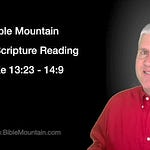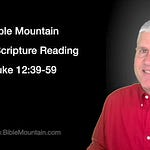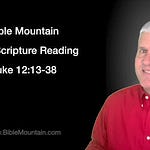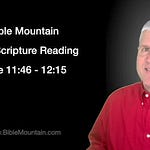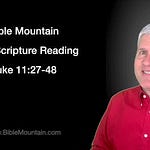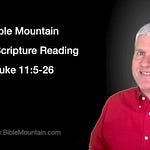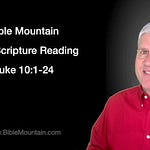Transcript:
Thanks for visiting Bible Mountain. Today’s episode is the first episode on the Gospel According to Mark.
In recent years it has been fashionable in evangelicalism to make the gospel message as palatable as possible. Many so-called evangelical preachers do not talk about negative topics such as sin or hell. The cost of being a Christian is not mentioned. Salvation is presented as something easy requiring nothing more than praying a simple prayer.
The motivation for this trend is to grow the church numerically. In some ways it appears it is working because mega-churches have expanded both in size and number. However, if the numerical growth is being driven by people who aren’t actually Christians, then the growth is not valuable.
The gospel message that is currently being preached in many so-called evangelical churches is deficient. One of the concepts that is ignored is the concept of repentance. Repentance must happen in order for salvation to actually take place. This word is seen throughout the New Testament. It was communicated from the very beginning of the ministry of both Jesus and John the Baptist.
Mark 1:1 ¶ The beginning of the gospel of Jesus Christ, the Son of God.
The word “gospel” means good news. Mark wrote down the good news regarding Jesus. Notice the word “beginning”. Mark started at the beginning.
Mark 1:2 ¶ As it is written in Isaiah the prophet:
“BEHOLD, I SEND MY MESSENGER AHEAD OF YOU,
WHO WILL PREPARE YOUR WAY;
Mark 1:3 THE VOICE OF ONE CRYING IN THE WILDERNESS,
‘MAKE READY THE WAY OF THE LORD,
MAKE HIS PATHS STRAIGHT.’”
Verse 2 is a quote from Malachi 3:1 in which Yahweh said He would send a messenger to prepare the way before Him.
Verse 3 is a quote from Isaiah 40:3. The 40th chapter of Isaiah contains the message the messenger would bring. The message was to prepare a smooth path for the entry of Yahweh.
Mark 1:4 John the Baptist appeared in the wilderness preaching a baptism of repentance for the forgiveness of sins.
Mark indicated John the Baptist was the messenger that had been foretold in the Old Testament.
Notice the word “repentance”. A core part of the message of John the Baptist was the need to repent for the forgiveness of sins.
It is trendy in many so-called churches today to avoid topics like sin, hell, and repentance. However, from the very beginning, repentance has been an integral part of the gospel message. A gospel message that does not include repentance is not a true gospel message.
Mark 1:5 And all the region of Judea was going out to him, and all the people of Jerusalem; and they were being baptized by him in the Jordan River, confessing their sins.
The people who were being baptized were confessing their sins. Many so-called preachers today do not want to talk about sin or confession, but those terms appear frequently throughout the New Testament.
The text doesn’t tell us where John the Baptist was in the wilderness or where along the Jordan River he baptized, but since it was people from Jerusalem and Judea being baptized, he was probably at the southern end of the Jordan River.
Mark 1:6 And John was clothed with camel’s hair and wore a leather belt around his waist and was eating locusts and wild honey.
Mark 1:7 And he was preaching, saying, “After me One is coming who is mightier than I, and I am not fit to stoop down and untie the strap of His sandals.
Mark 1:8 I baptized you with water; but He will baptize you with the Holy Spirit.”
Mark 1:9 ¶ Now it happened that in those days Jesus came from Nazareth in Galilee and was baptized by John in the Jordan.
Jesus grew up in Nazareth, which was in Galilee, in the north of the Holy Land. It was about 60 miles / 100 km from Nazareth down to the Dead Sea. That would have been a two day walk.
Mark 1:10 And immediately coming up out of the water, He saw the heavens opening, and the Spirit like a dove descending upon Him;
Mark 1:11 and a voice came out of the heavens: “You are My beloved Son, in You I am well-pleased.”
Mark 1:12 ¶ And immediately the Spirit drove Him to go out into the wilderness.
Mark 1:13 And He was in the wilderness forty days being tempted by Satan; and He was with the wild beasts, and the angels were ministering to Him.
Mark did not record the content of the temptation as Matthew and Luke did. However, Mark included a detail omitted by Matthew and Luke. Notice the term “wild beasts”. We often picture Jesus being in the wilderness with no care except that He was hungry. However, Mark hints that Jesus had to deal with wild animals. We don’t know the answer to this, but to what extent was Jesus in danger from the animals?
Mark 1:14 ¶ Now after John had been delivered up into custody, Jesus came into Galilee, preaching the gospel of God,
Jesus returned to Galilee to do His teaching.
Mark 1:15 and saying, “The time is fulfilled, and the kingdom of God is at hand; repent and believe in the gospel.”
Once again we see the word “repent”. When Jesus began teaching, the concept of repentance was one of the first concepts He talked about.
Mark 1:16 ¶ As He was going along by the Sea of Galilee, He saw Simon and Andrew, the brother of Simon, casting a net in the sea; for they were fishermen.
Mark 1:17 And Jesus said to them, “Follow Me, and I will make you become fishers of men.”
Mark 1:18 And immediately they left their nets and followed Him.
Mark 1:19 And going on a little farther, He saw James the son of Zebedee, and John his brother, who were also in the boat mending the nets.
Mark 1:20 And immediately He called them; and they left their father Zebedee in the boat with the hired servants, and went away to follow Him.
Mark 1:21 ¶ And they went into Capernaum; and immediately on the Sabbath He entered the synagogue and began to teach.
Capernaum was a small town along the Sea of Galilee. Capernaum was about 20 miles / 30 km away from Nazareth. It would have taken most of a day to walk from one to the other.
Mark 1:22 And they were astonished at His teaching; for He was teaching them as one having authority, and not as the scribes.
The word “astonished” often has a positive connotation. A positive understanding of that word would tell us the people were joyful about and pleased with the teaching of Jesus.
The word could also have a bit of a negative meaning which would indicate the people were astounded at the audacity of Jesus. Jesus was God, so He spoke as God. His method of teaching was very different than that of the scribes because the scribes were not God and did not pretend to be God.
Here is an illustration to understand this. If a secretary relays instructions from her boss to her boss’s subordinates, she would indicate that she is simply relaying instructions from her boss. However, if a boss is communicating to his subordinates, he would simply issue his instructions.
When the scribes taught, they were like the secretary, they were simply relaying instructions found in the Mosaic Law. When Jesus taught, He was like the boss. He had the authority to create instructions.
Mark 1:23 And immediately there was a man in their synagogue with an unclean spirit; and he cried out,
Notice the word “immediately”. As soon as Jesus began to teach, an unclean spirit interrupted Him.
Mark 1:24 saying, “What do we have to do with You, Jesus the Nazarene? Have You come to destroy us? I know who You are—the Holy One of God!”
The unclean spirit knew very well that Jesus was a threat.
Mark 1:25 And Jesus rebuked him, saying, “Be quiet, and come out of him!”
Mark 1:26 And throwing him into convulsions, the unclean spirit cried out with a loud voice and came out of him.
The unclean spirit had no choice. It had to obey Jesus.
In recent years it has been fashionable in evangelicalism to make the gospel message as palatable as possible. Many so-called preachers do not talk about sin, hell, confession, repentance, or the cost of being a Christian. Salvation is presented as something easy requiring nothing more than saying a simple prayer.
The motivation for this trend is to grow the church numerically. However, the gospel message that is currently being preached in many so-called evangelical churches is deficient and is not leading to salvation.
One of the concepts that is ignored is the concept of repentance. Repentance was taught and practiced from the very beginning of the ministry of both John the Baptist and Jesus. This word is seen throughout the New Testament. Repentance must happen in order for salvation to actually take place.
Thanks for visiting Bible Mountain. If you have already joined my email list, thank you and please tell others about Bible Mountain. If you have not joined my email list yet, please do so now. In order to join, go to Bible Mountain dotcom, click on subscribe, and that will take you to a page where you can sign up. Your email address will not be sold nor given away. Once again, thanks for visiting Bible Mountain.
“Scripture quotations taken from the (LSB®) Legacy Standard Bible®, Copyright © 2021 by The Lockman Foundation. Used by permission. All rights reserved. Managed in partnership with Three Sixteen Publishing Inc. LSBible.org and 316publishing.com.”




